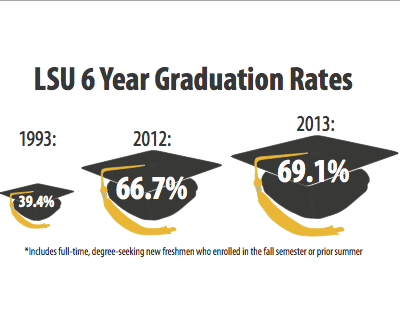While winning the next game is at the forefront of their minds, athletes at the University also are thinking long-term, looking beyond their competition. University athletes graduate at a higher rate than non-athletes, despite going through practices and competition in addition to classes, according to the NCAA’s Graduation Success Rate report.
The University’s six-year graduation rate reached an all time high of about 69 percent this year. According to the NCAA’s report, which covers the graduation success of athletes entering the University from the 2003-04 school year to the 2006-07 school year, the University’s athletes have an average graduation success rate of 81 percent.
The latest data available for measuring graduation success is from the group of student athletes who received scholarships and entered school in 2007 to allow student-athletes six years to graduate. The NCAA, unlike federal measures of graduation, also factors in student transfers.
At the University, student athletes are given resources to perform on and off the field. The most recent data available shows the University’s athletics graduation rate has increased by 12 percent since Vice Chancellor and Director of Athletics Joe Alleva began his tenure in 2008.
Offensive tackle La’el Collins said he thinks part of athletes’ success comes from the academic support they receive.
“We have so much academic support as far as tutors and advisers,” Collins said. “When you [start school], they set out a schedule where you can get all of your tutors in and not overwhelm you with just throwing you in classes.”
Athletes have access to the Cox Communications Academic Center for Student Athletes and have requirements for GPA and credit hours earned per semester to keep competing.
Collins said the support helps because football is like another class — requiring studying, watching film and long practices. Collins said his advisers and tutors send reminders to keep up with assignments.
The football program saw a 71 percent graduation rate for those entering in 2007.
Running back Terrence Magee said when athletes start in the football program, coach Les Miles emphasizes the importance of school to the players and their families.
“He lets us know that education comes first,” Magee said. “You’re a student before you’re an athlete. A lot of things are forced upon us, and a lot of guys look at it and they don’t want to do it. For me, it’s helped with a lot of classes.”
Jessie Jordan, a member of the gymnastics team and kinesiology senior, said she thinks athletes’ graduation rates are higher not only due to the support offered and drive for excellence athletes get from their coaches, but also to the way athletes are brought up also plays a role in their classroom success.
“You know, gymnastics isn’t going to last us our whole life,” Jordan said. “Not only are we competing at a high level and going to school getting the grades, we’re also preparing for life outside of gymnastics, after our four years of so much fun here.”
Jordan said there is a lot of academic support for athletes, but she also was raised from a young age to do well in school and to strive to do well on and off the mat.
“We have so much support here with the academic advisers, the tutoring,” Jordan said. “Every aspect of school that you would need help on there is support there. You just have to ask for it.”
Jordan said there is a reward system for the gymnastics team to celebrate the gymnasts’ academic successes.
“Here, whenever we get good grades, we have a system where you get a ‘tiger eye,’ which is really just a marble,” Jordan said. “But it’s just to say, ‘Hey, I’m doing well in school,’ like ‘Good job, so-and-so.’ I think that’s really a driving force, and really, all of us want to do well.”
The women’s golf and tennis team had a 100 percent graduation rate, while women’s basketball, swimming and gymnastics programs all had 92 percent success. Men’s golf and swimming also graduated at a rate of 92 percent.
“It’s our goal that every student-athlete who comes to LSU leave with a degree and be given every opportunity to have success in the classroom, in competition and be contributors in the community,” Alleva said in the release.
The University’s athlete graduation rate ranks almost 10 percent behind that of the University of Alabama and 2 percent lower than University of Florida, but it’s 5 percent higher than Texas A&M University and 3 percent higher than Auburn University.
University athletes graduate at higher rates than non-athletes
November 11, 2014

LSU’s Six-Year Graduation Rates







